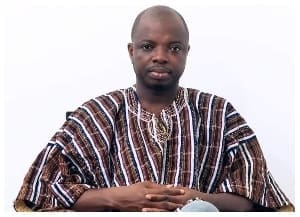Kwame Baffoe, the outspoken New Patriotic Party chairman known as Abronye, has been remanded into police custody following his arrest on charges of offensive conduct likely to breach public peace.
The Ghana Police Service confirmed Baffoe’s arrest on Monday, September 8, 2025, stating he was detained for “offensive conduct conducive to the breach of the peace.” He appeared before a court on Tuesday and was remanded to reappear on Friday, September 12.
Police have not disclosed specific details about the alleged conduct that prompted the arrest. The Bono Regional NPP Chairman remains in custody as investigations continue into the circumstances surrounding the charges.
The arrest follows Baffoe’s recent applications for political asylum in eight countries, including the United States, United Kingdom, France, Italy, Canada, Spain, Germany, and Côte d’Ivoire. In those applications, he claimed to face political persecution and threats to his safety, alleging government agencies were being weaponized against him.
Police sources confirmed that officers searched the residence of former NPP Greater Accra Youth Organiser Moses Abor on Sunday, September 7, in search of Baffoe, though he was not found at the location.
The case has attracted significant public attention given Baffoe’s prominence as a political commentator and party official. Known for his provocative statements and strong support for NPP positions, he has frequently appeared on radio and television programs across Ghana.
Baffoe’s arrest occurs during a politically sensitive period as Ghana approaches election season. His asylum applications, submitted to multiple Western nations and Ghana’s neighbor Côte d’Ivoire, had already generated controversy within political circles.
The charges of offensive conduct likely to breach public peace carry potential penalties under Ghanaian law, though courts often consider factors including intent, context, and public impact when determining outcomes. Legal experts note that such charges typically require evidence of statements or actions that could reasonably provoke public disorder.
NPP officials have not issued formal statements regarding their regional chairman’s detention. The party faces questions about how Baffoe’s legal troubles might affect its operations in the Bono Region, where he has served as chairman and maintained significant influence.
Political observers suggest the case could set precedents for how authorities handle inflammatory political rhetoric, particularly as campaign activities intensify. Ghana’s democratic institutions have historically emphasized peaceful political discourse, though enforcement of conduct standards has varied.
The Friday court appearance will determine whether Baffoe remains in custody or receives bail while investigations proceed. Legal representatives are expected to argue for his release pending trial, while prosecutors may seek continued detention depending on the severity of alleged conduct.
This development adds another layer to Ghana’s evolving political landscape, where social media and public statements by political figures increasingly face scrutiny from law enforcement. The outcome could influence how political leaders approach public communications in coming months.
The case also highlights tensions between freedom of expression and public order concerns, issues that democratic societies worldwide continue to balance. Ghana’s courts will ultimately determine where lines should be drawn regarding political commentary and potential consequences.
As Friday’s hearing approaches, attention focuses on whether additional details about the specific allegations will emerge and what legal arguments both sides will present regarding Baffoe’s continued detention.
Source: newsghana.com.gh











